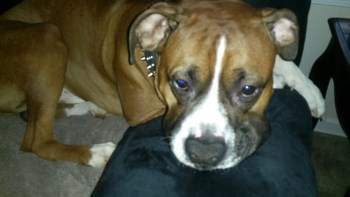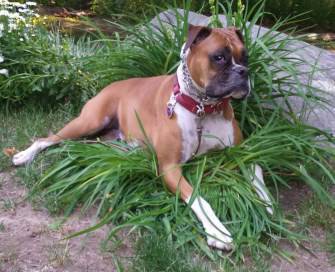Boxer Dog Snoring
Overview
If your Boxer puppy or dog snores, you may find this endearing, insomnia inducing or worrisome, depending on how loud it is and how often it occurs.
It's interesting to note that while canines can breathe through both the nose and mouth (like us), and do alternate between the two while awake, when a dog is sleeping, even if his mouth is hanging open, the majority of the time he will be breathing through his nose. This is due to canine instinct to pick up the scent of possible threats even when sleeping and if one of interest is detected, this will often be enough to wake up the dog.
It is not uncommon for Boxer dogs to snore, though super heavy snoring may point to certain health issues or the need for correction of one of several anatomy issues that this breed is prone to.
In this section, we are going to cover:
- What causes snoring noises with the Boxer breed
- How much snoring is normal for this breed
- What you need to know about snoring and sleep apnea
- Ways to help stop a Boxer from loud, chronic snoring
- Possible health issues related to snoring
Please note: AllBoxerInfo is reader-supported. Some of the product suggestions on this page are affiliate links. As an Amazon Associate we earn from qualifying purchases. This is at no extra cost to you and helps keep this site running.

Tyson, 3 months old
Photo courtesy of Sairaj
What Causes a Boxer Dog to Snore
Anatomy- When a dog breathes normally and is not snoring, he draws air into the nose and it gently passes by the soft palate (the back of the roof of the mouth) and is inhaled into the lungs.
The reason why so many Boxers snore is because of the facial structure of this breed. Being a Brachycephalic breed (somewhat flat, compressed face as opposed to dogs that have longer snouts), it is common for a Boxer to have:
- Stenotic nares (narrow nostrils)
- Elongated soft palate
We will dive into medical issues ahead, however some Boxers will also have:
- Hypoplastic trachea - The trachea is surrounded by rings of cartilage; with this there is abnormal growth of these rings, which causes the trachea to be too narrow. Other signs beside snoring are coughing and labored breathing while awake.
- Everted Laryngeal Saccules - Tissue that is located very close to the vocal cords is pulled into the windpipe, causing an obstruction.
Of these 4 elements, it is often the elongated soft palate that is the culprit with chronic, heavy snoring that occurs without
any other concerns such as trouble breathing, coughing, etc.
The palate (also referred to as the velum or muscular palate) is soft tissue that is located in the back of the mouth. This somewhat innocent piece of flesh actually plays quite a few important roles.
There are 5 muscles located within it:
1. The tensor veli palatine muscle, which helps a dog swallow
2. The palatoglossus muscle, which also aides in swallowing
3. The levator veli palatine muscle, which is the 3rd one that helps a dog swallow food
4. The palatopharyngeus muscle, which aids in breathing
5. The musculus uvulae muscle, this works to move the uvula (the piece of flesh you can see hanging down at the top of a dog's throat behind the soft palate) and this plays a role for such things as not allowing food to enter the nasal cavity, is involved with the gag reflex and with vocalizations.
So, while the soft palate is a necessary part of a dog's anatomy, with Boxers and other brachycephalic breeds, this tissue can be much longer in relation to the size of the mouth than with dogs that have long snouts. With snoring, as air passes by the extra flesh, it causes it to vibrate against the back of the throat and that is the noise that you hear.
Other Less Common But Possible Reasons that Add to the Level of Snoring
Allergies -
When you have a dog that already is prone to snoring and you add on allergies which can cause excessive mucus in the nasal cavities and/or inflammation in the breathing passages, this can cause much more excessive snoring.
These may be contact, seasonal (pollen, etc.) or food (most food allergies are due to food additives found in commercial brands such as artificial coloring, preservatives and/or artificial flavoring).

Max, 2 and 1/2 years old
Photo courtesy of Jerry Fisicaro
Signs of allergies include: Red eyes, eye discharge, nasal discharge,
skin issues, itching, thinning coat, hot spots, sneezing, coughing and/or wheezing.
Dental issues -
If a dog has an infected tooth, the infection can travel up into the nasal cavities causing inflammation that leads to snoring. If this suspected, you will want to rule this out since an untreated tooth infection can eventually spread to vital organs including the brain and heart. All Boxers should have their teeth brushed at home, be given quality dental treats and have yearly oral examinations by a reputable veterinarian.
Aspergillosis -
While this fungal disease is rare, it should not be ruled out, especially for those that live in an area where a Boxer puppy or dog may have access to hay piles, mounds of grass clippings, dead leaves, compost piles and the like where this particular mold can grow.
The most common signs of this in addition to snoring include: Coughing (dry or coughing up brown mucus), fever, lethargy, wheezing and/or weight loss. There may also be headaches, pain (in the bones and in the chest area), shivering, skin lesions, vision issues and/or decreased urine.
Foreign Body -
We all know how Boxers are capable of swallowing things that they shouldn't (which can lead to internal blockage
in some cases) and it is also
always possible that a pebble or other object has become lodged in the nose.
With this, there will be sudden onset snoring with a dog that previously did not have a snoring problem. The Boxer may also paw at his nostril.
While you may be able to see the culprit by looking up the dog's nose with a flashlight, some Boxers will snort super deep and the object will be sucked up the nose, too far for you to see it. In most cases, a vet can detect it and remove it rather quickly.
Being overweight -
It is not uncommon for senior Boxers to have some weight gain and not have that super sleek, muscled look that they did when younger. Excess fat, especially around the neck and chest, can cause bulky throat tissue which exasperates any current issue with the soft palate common with this breed.
Since canine obesity is linked to diabetes, can cause orthopedic issues, puts a strain on the heart and is generally known to shorten a dog's life span
by 6 to 12 months, you'll want to stay on top of this.
If your Boxer is 15% or more over his ideal weight, this can be considered overweight and if he is 30% or more than his ideal weight, it is considered obese. If your Boxer is too heavy and has a snoring problem, you'll want to speak to your vet regarding a gradual decrease of calories (while keeping quantity the same; accomplished by switching out high calorie ingredients for low calorie foods such as vegetables) and slowly increasing daily exercise.
How Much Snoring is Normal
While there is no official percentage, more Boxer dogs snore than those that do not. This will vary from light, random snoring that is barely noticeable unless your Boxer's head is right near you while he's sleeping… to rather loud snoring that can be quite intense especially in an otherwise quiet home.
The sound of snoring with many Boxers can be summed up by the phrase 'sawing logs' though with some Boxers it can be a wet, gurgling sound or a rather raspy snorting noise.
It can sometimes be difficult for owners to know how much snoring is normal for Boxer dogs…
And some things to look at are:
- Does it interfere with his sleeping? (More ahead on related consequences of snoring)

Bella Fiora
Photo courtesy of Eileen
- Is the Boxer making other noises when awake, such as gasping or choking sounds?
- Does the Boxer have trouble breathing when exercising?
If these concerns are present, this often points to an issue much larger than just snoring that may need to be corrected via surgery.
Snoring and Sleep Apnea with Boxer Dogs
If you think that snoring is harmless, you are not alone however this is not entirely accurate. Recent studies have linked canine snoring to sleep apnea which is a rather serious condition that can affect a dog's
health and even his mood.
This is not to say that every Boxer dog that snores is going to have this issue… however it is a good idea to take note of the signs and see if any of this rings true for your Boxer:
Sleep apnea is a disruption of breathing during sleep. A dog may have times throughout the night when his breathing becomes very shallow or there can be periods lasting from 10 to 20 seconds when breathing stops altogether. Snoring is the main symptom of sleep apnea.
And if a Boxer does have this, it can lead to being excessively sleepy during the daytime (hypersomnia), having dry mouth problems or a sore throat, suffering from headaches and causing the dog to be irritable. If you believe that your Boxer may have this, it is important to bring this to the attention of the vet.
Health Issues Related to Snoring with Boxer Dogs
As we touched on above, it is very common for Boxer dogs to have the issues that are typically seen with Brachycephalic breeds. Most Boxers will have elongate soft palate to at least a minor degree and a good percentage of them will also have stenotic nares (narrowed nostrils) to a small degree… this is expected of the breed due to the facial structure.
However, the key to keep in mind is that some Boxers will have moderate to severe issues with these that will need to be corrected with a relatively simple reconstructive procedure.
Brachycephalic Airway Syndrome
- This is the medical term given if a dog has both elongate soft palate and stenotic nares, along with Hypoplastic trachea (narrowed trachea) or Everted Laryngeal Saccules (tissue is pulled into the windpipe).
Even with having the combination of all of these issues, a Boxer may only have the symptom of snoring, if they are mildly affected.
In cases of moderate to severe cases, there will be two or more of the following:
- Heavy, chronic snoring
- Snorting - When awake and/or asleep
- Heavy breathing- Especially when excited
- Tiring easily
- Coughing
- Gagging
- Dry heaving
- Vomiting
- Fainting
How to Help a Boxer Dog Stop Snoring
If your Boxer has a clean bill of health and the only issue is snoring, there are actually a few effective methods to help cut down on how loud your dog snores and/or the frequency of the snoring. You'll find more success if you implement most or all of these as opposed to just one:
1) A large round shaped bed. How much a Boxer snores can be affected by the way in which a dog positions his body when sleeping; this is due to compression of the airways and/or from pressure being placed on the chest and neck. When a Boxer is encouraged to slightly curl his body into a long, stretched out arc when sleeping, this allows the airway to expand.
2) A pillow.
Boxers are super good at sleeping in all sorts of odd positions and if the neck is scrunched up or the face is buried down, this can cause more snoring. While not every puppy or dog will be receptive to the idea of having the head elevated by a pillow, some will…
(You may find that this is easier to implement if you wait until your Boxer is snoozing) so propping an appropriately sized pillow under your Boxer's head when he's sleeping can allow him to breathe easier during the night.
***
Choosing a great bed for your Boxer
with a raised bumper on one end can offer both the right sleeping surface and a way for him to stretch his neck appropriately.
3) Run a humidifier
- For dogs that snore due to allergies, running a humidifier near his sleeping area to add moisture to the air can help clear breathing passages, which in turn cuts down on snoring.

RJ (Rowdy Jr.), 1 year, 6 months old
Photo courtesy of Brandi Lavender (Alabama)
4) Eliminate irritants. While fewer people in the US smoke than ever before (less than 20%), smoke can exacerbate snoring; this goes for those who do it and for those that inhale the second hand smoke. If anyone in your household is a smoker, it is highly recommended to ban this practice from the home.
Studies show that inhaling secondhand smoke does expose a pet to cancer
causing chemicals just as it does to humans and with dogs such as the Boxer, lung cancer (as opposed to nose and sinus cancer) is the biggest threat.
In addition, try to avoid spraying air fresheners and other aerosol products into the air near your puppy or dog.
5) Keep your Boxer at a healthy weight.
It's normal for puppies to be rather round before they mature; Boxers under the age of 2 should never be put on a diet… Adolescent and adult Boxer dogs should be on a super healthy meal plan and given lots of exercise to stay fit and in tip-top shape.
As we discussed earlier, older senior Boxer dogs may gain some weight as they age, however you will not want your Boxer to go over 15% of his ideal body weight and staying under 10% over is a good idea.
If your Boxer is a bit too heavy, discuss a healthy eating plan with your vet, along with a gradual increase in activity to help him/her slowly shed any excess bulk.
A Final Word
There's usually no need to worry if your Boxer regularly snores at night; this is seen more often than not with this breed.
It may keep you up at night, however some light snoring - without any other symptoms - that does not interfere with a Boxer's sleep is normal.
However, since there is a host of related issues including stenotic nares and elongated palate that may be severe enough to require surgery and other possibilities such as sleep apnea, do please access your Boxer for any of the signs and symptoms that we have discussed.
